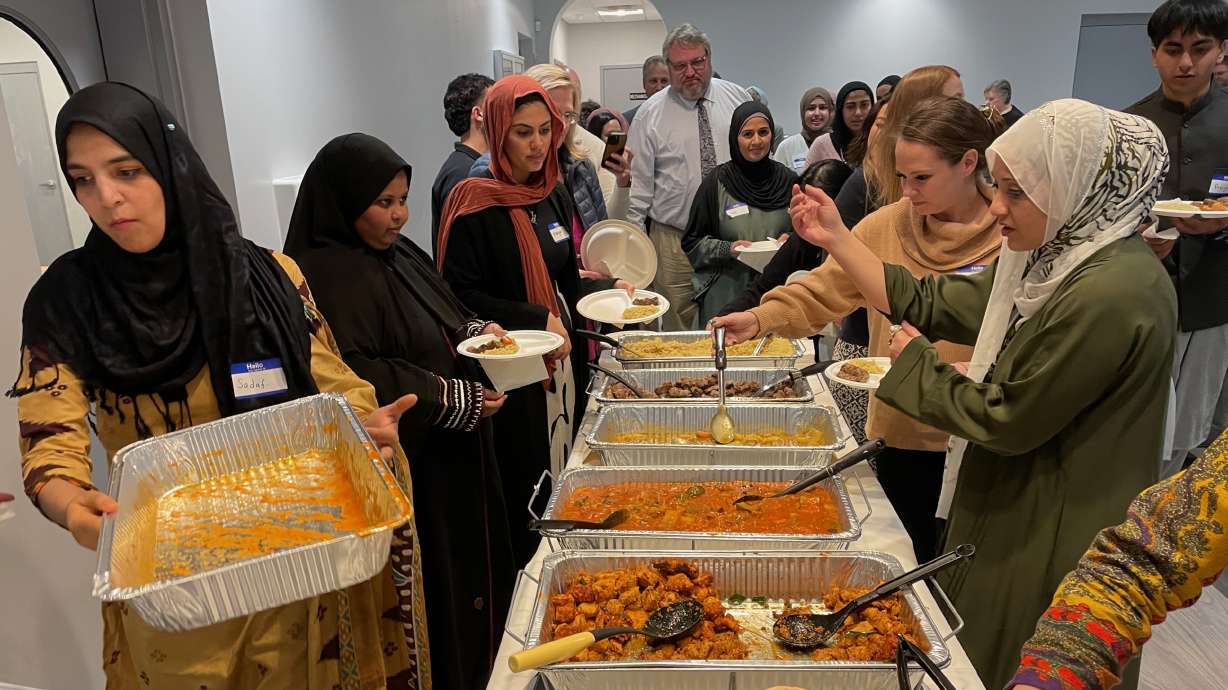Estimated read time: 3-4 minutes
This archived news story is available only for your personal, non-commercial use. Information in the story may be outdated or superseded by additional information. Reading or replaying the story in its archived form does not constitute a republication of the story.
WEST JORDAN — Sure, Ramadan means going a long time without eating or drinking each day.
Now, entering its second week, though, Zain Kergaye has adjusted to the fasting. "We can manage. It's not like we're struggling to get through the day," he said.
More significantly, going without food or drink from sunup to sundown each day, and the other elements of Ramadan, help with his spiritual growth.
"Life goes by really, really fast," said Kergaye, a University of Utah student. "Ramadan is to stop and take a break and have some reflection on yourself. ... This allows us to take a step back and increase our faith."
Utah is home to some 60,000 Muslims, estimates Zeynep Kariparduc of the Emerald Hills Institute. Ramadan, the holiest month for Muslims, started the evening of March 10 and, with about two weeks to go, the faithful in Utah and beyond have been fasting, praying, giving and reflecting as they aim to deepen their connection with God.
"During Ramadan, our spirituality is heightened," Kergaye said.
Kergaye and other members of the Utah Islamic Center in West Jordan gathered Sunday evening for an interfaith iftar, the meal that breaks the fast each day, inviting the public to the event.

"It is a month of celebration," Shuaib Din, the imam and director of religious affairs at the mosque, told the gathered crowd. "It is a month of meditation. ... It is a month of sharing. It is a month of fellowship and coming together."
The fasting serves as a form of self-discipline, Kariparduc, who is Muslim, said in an earlier interview with KSL.com.
"By fasting, Muslims demonstrate their obedience and submission to the commandments of Allah. Fasting is considered a means of spiritual purification, allowing Muslims to cleanse their souls from impurities and sins. It provides an opportunity for self-discipline, self-control and self-reflection, leading to become a better person spiritually and socially," she said. Her organization, the Emerald Hills Institute, promotes interfaith understanding and has helped organize at least three community iftars across Salt Lake County.
Prayer — five times a day — is also a central element of Ramadan as is deeper reflection on the Quran, the central religious text of Islam. Mehwish Javeed, who attended Sunday's iftar, said she's been redoubling efforts to teach her kids elements of the Quran, first revealed during Ramadan. Reading the holy book in its entirety during Ramadan is another common practice.
Din led the members of the mosque in prayer before they ate on Sunday, and he said about two more hours of prayer are standard after the iftar each evening during Ramadan. Ramadan lasts until April 9 this year.
Giving is also very important during Ramadan. Kashif Buttar said he donates to varied causes throughout the year but redoubles his giving during Ramadan. "It kind of reminds me to be closer to God," he said, and offering a helping hand to those in need is central in that.
Beyond the more religious elements of Ramadan, it also serves to help promote familial bonds, Javeed said. The various members of her family are so busy that they often eat at disparate times. That's not the case during Ramadan, though. "This is one time we eat together," she said.
Members of various other faiths were present on Sunday, including Sue Prottas of Congregation Kol Ami, a Salt Lake synagogue. People of varied faiths "should all be able to get along and live harmoniously," she said.
Neale Neelameggham, from the Hindu community, echoed that sentiment. "Conflicts come from not understanding the other person," he said.










